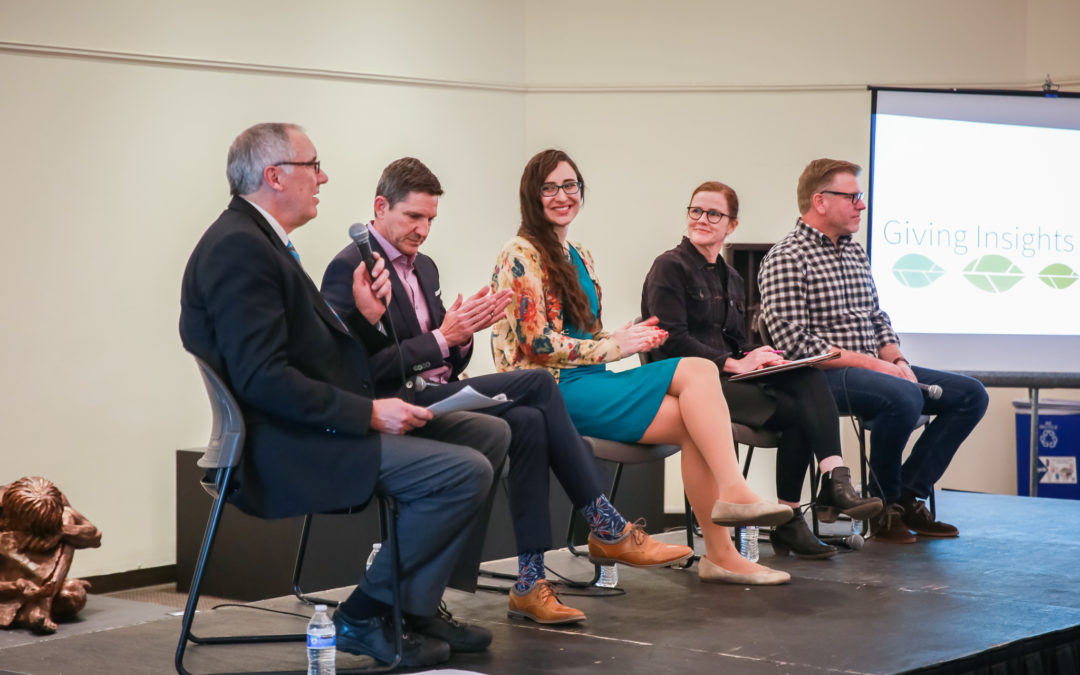By: Matthew Davis
Five millennials in Los Angeles gathered for dinner in 2010 to discuss their lives after the loss of loved ones.
Later known as “The Dinner Party,” it grew into a movement across the U.S. in an effort to do grief support a new way. St. Mary’s Press president and CEO John Vitek described it as an example of the spiritual search of religiously unaffiliated millennials during a Nov. 8 forum.
“So they began this thing where they invited others their age who experienced a sense of loss, [but] have no religious affiliation where that’s being reconciled,” Vitek said of The Dinner Party. “And they … came together out of their suffering and sorrow over a meal with a bottle of wine to heal one another.”
Vitek described this as “religious identity reconstructed.” “As we de-construct our religious identity that’s tied to this traditional institution, we reconstruct a new religious identity,” he said.
Vitek spoke as one of four panelists as the Giving Insights forum on engaging and retaining millennials and post-millennials in the life of the Church. More than 100 people attended the forum, which was organized by the Catholic Community Foundation, at the Basilica of St. Mary in Minneapolis.
Theology professor Jeffrey Kaster of St. John’s University in Collegeville served as the moderator for the discussion. Panelists included John Poitevent of Los Angeles-based Catholic leadership network Parish Catalyst, Nataleigh Waters of Anselm House at the University of Minnesota, and Jennifer Tacheny of the Sisters of St. Joseph of Carondelet and Consociates in St. Paul.
“I really appreciated hearing so many different perspectives,” said Natalie Nation, a senior at St. Catherine University in St. Paul.
Nation works in young adult social justice ministry as an intern with Tacheny, the co-director of Young Adult Spirituality. Nation also took summer theology classes at St. John’s during high school, where she was taught by Kaster, the director of the Youth in Theology and Ministry program.
“It was cool to hear my own experiences reflected through what they were saying,” Nation said.
The community experience of both of her related endeavors stood out to her. Community was a common theme among the panelists’ comments.
Waters, who works as the student program coordinator at Anselm House, spoke of the fruitfulness of community. Anselm House in an ecumenical Christian study center in St. Paul that serves students at the University of Minnesota.
“My peers are striving for holiness by asking really, really beautiful questions and walking with them in ways that I’m amazed at,” Waters said. “We all have a common enemy, and it’s not each other.”
She said Anselm House gives young adults a place to belong and challenge themselves and each other. Waters also added that is doesn’t mean that young adults need to focus on young adult groups only after college. Rather, she said, young adults need to integrate into a parish.
Poitevent said that millennials (people born between 1981 and 1998) and post-millennials (people born after 1998) seek purpose and authenticity. He noted that many accept up to 40 percent less salary to work in a job serving a cause for which they’re passionate. He added that the Church doesn’t need to re-brand itself, but rather “lean into the call” of who it is.
A St. Paul-based philanthropic nonprofit that supports Catholic organizations, the Catholic Community Foundation hosted a Giving Insights forum on the topic of millennials and post-millennials for a second-straight year. Last year’s conversation explored the issues of young adults leaving the Church and the need to engage them, some of the themes explored last month during the synod on young adults at the Vatican.
Vitek drew insights from the recent study “Going. Going. Gone: The Dynamics of Disaffiliation in Young Catholics,” which St. Mary’s Press commissioned from the Center for Applied Research in the Apostolate at Georgetown University.
The reasons for millennials and post-millennials leaving can’t be pinned on one thing, he said; instead, it’s a gradual “chinking away,” similar to the breakdown of a marriage.
In the case of The Dinner Party’s founders, he believes one of those “chinks” came when they didn’t receive the care they needed from their respective faith communities during a loss at an early age.
“And there was no one there at their side to accompany them,” Vitek said.
Attendee Joshua Munoz, 26, a parishioner of St. Stephen in Minneapolis, saw community as a solution to that.
“What really hit it [for me] was community,” said Munoz. “A community is knowing your name. They miss you when you’re gone.”
Two more panels in this Giving Insights series are scheduled for April 9, 2019, on immigration, and June 25, 2019, on Catholic schools. For more information, visit ccf-mn.org/events/forums.
Go to the Catholic Spirit website.

